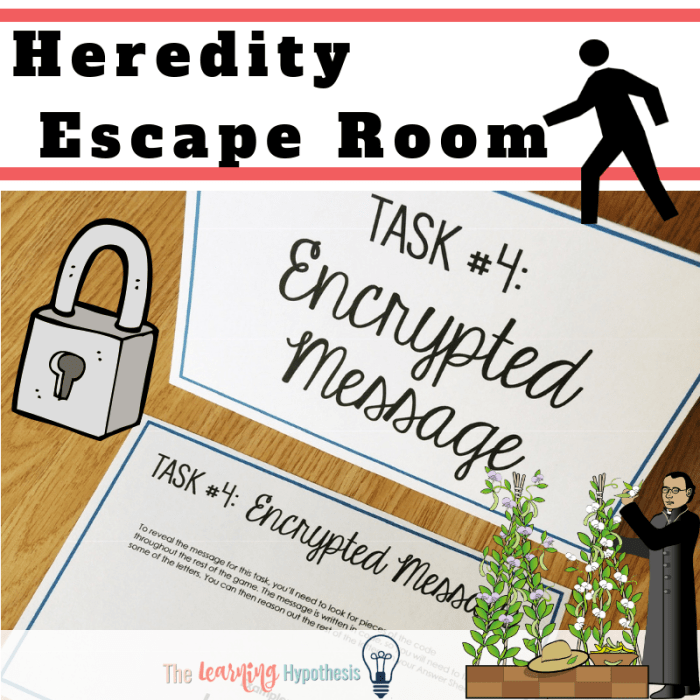Embark on a thrilling intellectual adventure with genetics and heredity escape rooms, where the boundaries of entertainment and education blur. These immersive experiences not only challenge your wits but also provide a captivating platform to unravel the mysteries of genetics and heredity, leaving you with a profound appreciation for the intricate workings of life.
Delving into the intricacies of DNA, Mendelian inheritance, and genetic disorders, these escape rooms offer an unparalleled opportunity to engage with complex scientific concepts in a hands-on and interactive manner.
Genetics and Heredity in Escape Rooms
Genetics and heredity are fundamental concepts in biology that explain the transmission of traits from parents to offspring. Escape rooms offer a unique opportunity to explore these concepts in a fun and interactive way. By incorporating genetics and heredity into their puzzles, escape rooms can educate participants about the principles of inheritance while also providing an entertaining experience.
Examples of escape rooms that incorporate genetics and heredity include “The DNA Dilemma,” “The Genetic Legacy,” and “The Mendelian Maze.”
Designing an Escape Room with Genetics and Heredity: Genetics And Heredity Escape Room
Designing an escape room with genetics and heredity as its focus presents both challenges and opportunities. Challenges include ensuring that the puzzles are both educationally sound and engaging. To create puzzles that meet these criteria, it is important to research the subject matter thoroughly and to collaborate with experts in the field.
Research is essential for ensuring that the puzzles are accurate and up-to-date. Collaboration with experts can provide valuable insights into the latest developments in genetics and heredity, and can help to ensure that the puzzles are challenging and engaging.
Benefits of Incorporating Genetics and Heredity into Escape Rooms

Incorporating genetics and heredity into escape rooms offers several benefits. First, it can help to teach these concepts in a fun and interactive way. Escape rooms provide a hands-on learning experience that can help participants to understand the principles of inheritance in a more concrete way.
Second, escape rooms can help to promote STEM education. By exposing participants to genetics and heredity in a fun and engaging way, escape rooms can help to spark interest in these fields and encourage participants to pursue further study in STEM.
Examples of Genetics and Heredity Escape Rooms

| Escape Room Name | Location | Puzzle Type | Educational Value |
|---|---|---|---|
| The DNA Dilemma | New York City, NY | Logic puzzles, codebreaking | Teaches the basics of DNA structure and function |
| The Genetic Legacy | Los Angeles, CA | Physical puzzles, teamwork | Demonstrates the principles of Mendelian inheritance |
| The Mendelian Maze | Chicago, IL | Navigation puzzles, problem-solving | Introduces the concepts of dominant and recessive alleles |
| The Gene Genie | London, UK | Technology-based puzzles, augmented reality | Explores the latest advances in genetic engineering |
| The CRISPR Challenge | Tokyo, Japan | Coding puzzles, simulation | Provides an overview of the CRISPR-Cas9 gene editing system |
Future of Genetics and Heredity Escape Rooms
The future of genetics and heredity escape rooms is bright. As the field of genetics continues to evolve, new technologies and discoveries will provide opportunities for the development of even more innovative and engaging escape rooms.
One trend that is likely to continue is the use of technology in escape rooms. Technology can be used to create more immersive and interactive experiences, and it can also be used to introduce new concepts and challenges into puzzles.
Another trend that is likely to continue is the use of escape rooms in educational settings. Escape rooms can be a valuable tool for teaching genetics and heredity in a fun and engaging way. As more schools and universities adopt escape rooms as a teaching tool, the demand for genetics and heredity escape rooms is likely to increase.
User Queries
What are the benefits of incorporating genetics and heredity into escape rooms?
Escape rooms provide an interactive and engaging way to teach complex scientific concepts, making learning more enjoyable and memorable.
How can escape rooms spark interest in genetics and heredity among participants?
By presenting these topics in a gamified and immersive setting, escape rooms can capture the attention of participants and foster a curiosity about the subject matter.
What are some examples of genetics and heredity escape rooms?
Examples include “The DNA Enigma,” where participants solve puzzles related to DNA sequencing, and “The Mendelian Mystery,” which challenges players to understand the principles of Mendelian inheritance.
